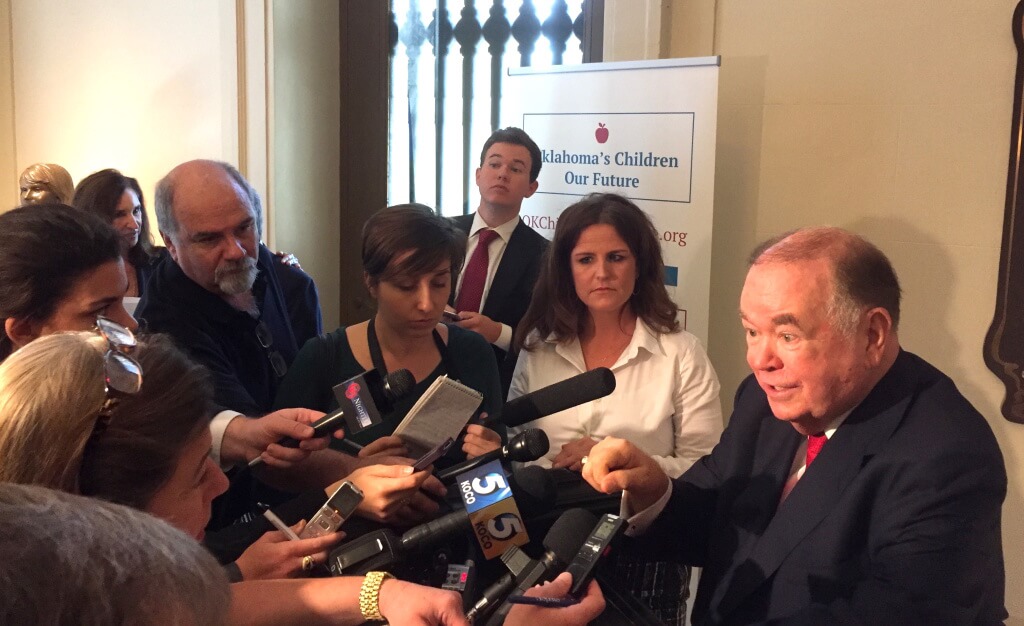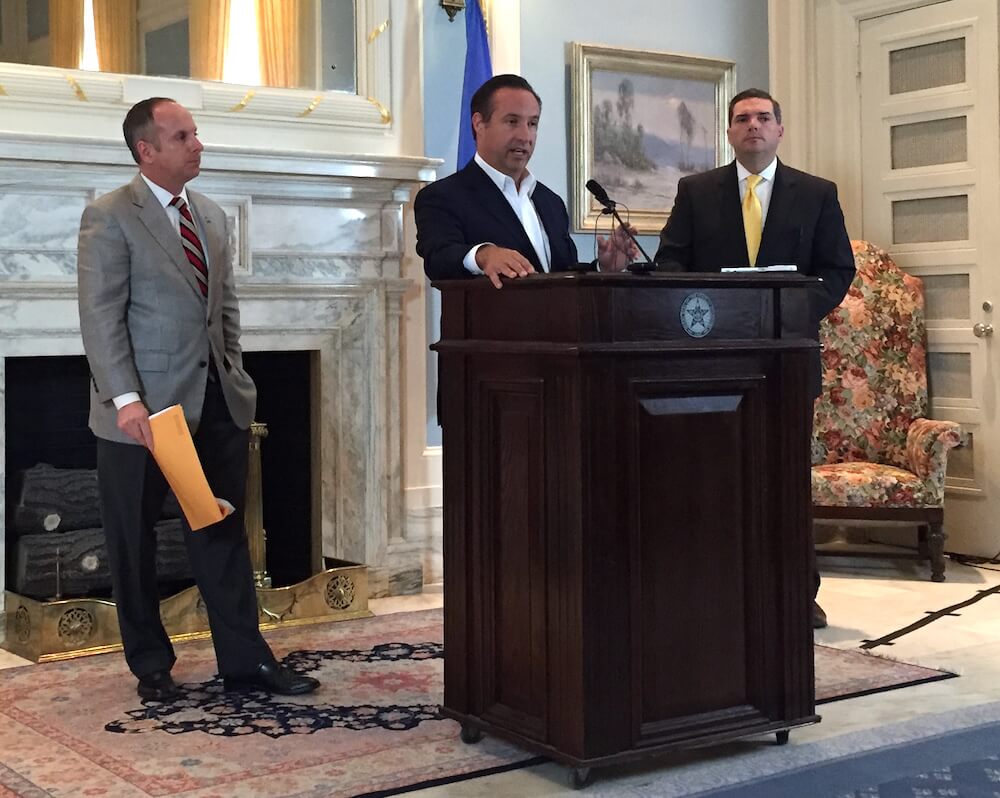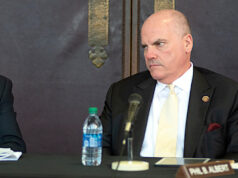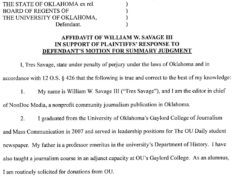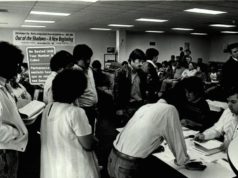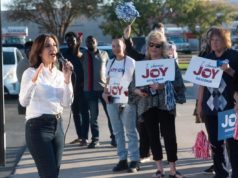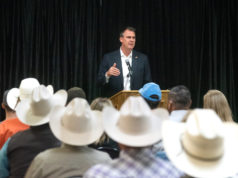In the face of a one-cent sales tax increase proposed by dozens of Oklahoma education, business and philanthropic leaders, members of Oklahoma’s executive and legislative branches are working to craft an alternative proposal on education that would be more palatable to Republican leadership, NonDoc has learned.
University of Oklahoma President David Boren launched the Oklahoma’s Children — Our Future initiative-petition campaign in October. The former governor and U.S. Senator says he is acting only as a private citizen, and he has enlisted the public support of billionaire George Kaiser, retired OSU basketball coach Eddie Sutton, country singer-songwriter Toby Keith and Chickasaw Nation Gov. Bill Anoatubby.
But Republican elected officials and staff members have quietly been criticizing Boren’s education funding proposal, crafting talking points against it and recognizing that they must propose and follow through on ideas of their own to improve teacher pay, even while the state faces a $900 million budget shortfall.
“It would be accurate to say that we are looking at funding sources,” said Secretary of State Chris Benge, a member of Gov. Mary Fallin’s cabinet. “The executive level (is) discussing options and trying to develop a plan for next session. The House and the Senate could be doing something as well, but I’m not aware of that right now”
Other sources, however, say Fallin’s office and budget department are engaging legislative leaders earlier than normal regarding the upcoming year’s executive budget. Typically, the governor releases her proposal in launching the legislative session. House and Senate leaders begin their own processes, eventually producing a budget framework toward the end of April or the beginning of May.
This year, state revenue challenges have led Fallin’s leadership to start dialogues and negotiations with the Legislature more quickly than normal in an attempt to achieve early consensus on big-picture items. In all, leaders are looking to deal with the $900 million shortfall at the same time they seek new or re-directed revenues to focus on education.
Among other shortcomings, Oklahoma continues to face what many call a teacher shortage. With the Boren sales-tax proposal intending to fund $5,000 teacher raises and other improvements, state leaders have extra incentive to formulate their own education plan while Boren’s proposal looms over public education discussions.
RELATED
“Boren launches campaign to fund education through tax” by William W. Savage III
“I think the goal is to show there are other ways of achieving the same (thing),” an executive team member told NonDoc on the condition of anonymity. “It’s about prioritizing spending both in education as well as other areas of (the) budget.”
Boren’s goal, meanwhile, is to increase both common and higher education funding through a $0.01 sales tax that intends to raise more than $600 million annually. Additionally, the Legislature would be barred from poaching those funds for other spending priorities.
The initiative-petition proposal is facing a court challenge from OCPA Impact, which authored a commentary on NonDoc opposing it. The Supreme Court is deliberating on the matter currently, and they could void the petition altogether as a violation of the state’s single-subject requirements.
According to House Speaker Jeff Hickman (R-Fairview), “There’s been a lot of discussion” about education funding and reform, and he said he does not see Boren’s proposal forcing the hands of legislators or the governor.
“A lot of this work has been going on, and maybe people just weren’t aware of it, but there have been proposals out here floating around,” Hickman said Thursday after a budget-related press conference. “There’s been a lot of discussion about how you do this. But the problem has been the health insurance increases are eating up all of the dollars that used to be available to do teacher pay raises. And so for years we’ve been trying to figure out how to address that.
“How do we get more dollars into the classrooms? I think that’s where the push will be here — getting more dollars into classrooms, getting more dollars into teachers’ salaries, using the existing resources we have, which are at record levels but aren’t getting where they need to,” Hickman said.

Benge, a former House speaker himself, said he is drawn to the topic of education because he believes it’s “the most important thing we do down here (at the Capitol).”
“We have a lot on our plate when it comes to education next year,” Benge said. “The standards process needs to be finalized and approved. And, of course, the funding piece of that will be a part of that, and I think the teacher pay issue has to be addressed as well.”
From where Hickman stands, however, he said legislators will not look tone deaf if teacher pay raises prove impractical this year.
“When you have a $900 million budget shortfall and you’ve got 11,600 Oklahomans that have lost their jobs and don’t have a job, and we’ve got thousands of state employees who have shouldered significant budget cuts, I don’t know that it necessarily looks tone deaf not to be talking about a raise for some employees at the same time you have a lot of other Oklahomans out of work,” Hickman said. “But to develop a long-term strategy and plan is something we have been working on and should continue to work on, and it’s because education is a priority.”
Hickman noted that total compensation packages for Oklahoma teachers — including insurance and retirement — are actually higher than some studies and reports suggest, and he noted that common education has more money than ever before, though much of it is going to insurance costs, utility bills and other administrative functions.
“We were toward the bottom in teacher pay when Democrats had majorities,” said Hickman, who will be term limited after this session. “We’re still toward the bottom in teacher pay when you look at just salary with Republican majorities, so it’s our challenge to fix now.”
As for the Boren proposal, Hickman stuck to the facts and avoided taking a position, a tactic he surely employed while serving as Boren’s press secretary from 2000 to 2003.
“There’s a petition process to put something on the ballot. There’s a process in place that allows Oklahomans to vote on it, and if they want to raise their sales tax in order to put even more money into education than what we’re already spending, then I’ll respect that,” he said. “I don’t have an issue with that. But if the case is going to somehow be made that Oklahomans have to be taxed more, that they have to raise their taxes, because somehow the Legislature has not provided adequate funding, then I would take great exception to that.”
RELATED
“Oklahoma revenue failure: ‘There you have it, folks’” by William W. Savage III
Amber England, executive director of Stand for Children Oklahoma and a supporter of the Boren proposal, said she is excited that the possibility of a statewide education ballot initiative has helped spark funding discussions at the Capitol.
“We’ve heard chatter about legislative leaders and statewide elected officials trying to come up with a plan for a teacher pay raise,” England said. “It’s important to understand the ballot measure raises close to $615 annually to improve education, including funds to improve reading, increase graduation rates and make college and career training more affordable.”
Stand for Children is a national advocacy organization with chapters across the United States. The organization, along with many others, is formally supporting the proposed ballot initiative.
“Any proposal put forward by budget writers should include those provisions, in addition to at least a $5,000 pay raise for teachers,” England said. “If not, it’s likely a band-aid solution to a problem that needs a comprehensive, long-term plan, like the one put forth by Oklahoma’s Children — Our Future.”
Hickman expressed a desire for the public to understand just how much money already goes to education in Oklahoma.
“The Oklahoma taxpayers are paying $0.51 of every $1 on education,” Hickman said. “Thirty-three percent of that is on common ed alone. So we’re spending dollars, but I just don’t think they’re getting to the right places.”










